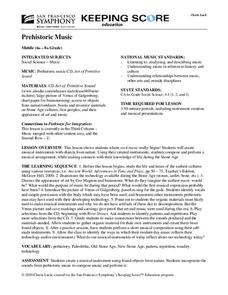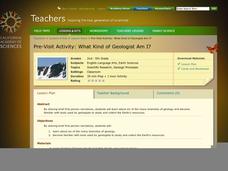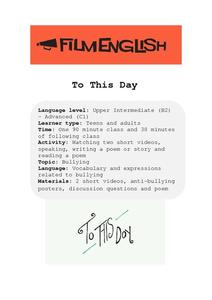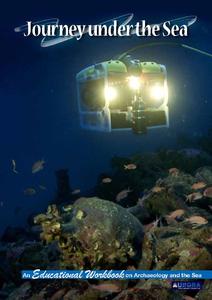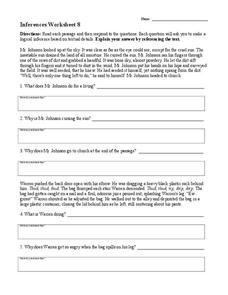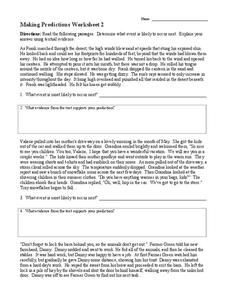SF Environment
Sort and Color!
Sorting is a very important skill that can be used in math and even science. Learners get familiar with some environmentally friendly vocabulary terms as they practice separating objects that can be recycled from those that can't. They...
Curated OER
Stem Cell Development
Like a fresh canvas, stem cells can turn into almost anything. In a comprehensive lesson, high school biologists use clay to build a 3-D model of cell division and the processes that occur during the first 14 days of development. Also...
San Francisco Symphony
Prehistoric Music
What was music like during the Stone Age? Learners listen to a CD entitled, Art of Primitive Sound as they consider the culture of people in the Stone Age. They use objects found in nature to create instruments, and then perform a...
Curated OER
You are the Archaeologist
Kids can practice their observation and evidence-based argument skills with a fun and engaging look at artifacts. With a given set of objects, each child will sketch and describe the object, then partners work together to determine...
National Geographic
Genetic Markers: Connecting the Dots
Biology buffs simulate how genetic markers are passed among populations in order to understand how these markers can help anthropologists map human migration. A couple of volunteers leave the room while you walk the remaining learners...
Curated OER
Games around the World
There are three little words every teacher is just dying to hear; investigate, discuss, and play. Kids love those words too, and they'll love finding out what types of things children did for fun long ago. As homework, they interview...
BioEd Online
Muscle Fibers
What better way to learn about muscle than by dissecting one? Using cow muscle (beef), learners compare bundles of yarn to muscle fibers as they explore each. The supplemental reading about astronauts losing muscle mass in space and what...
BioEd Online
Center of Gravity
Between the pull of gravity and the push of air pressure, it's a wonder animals can balance or move at all. With a hands-on lesson about the center of gravity, learners discuss their own experiences with the topic, then work with...
California Academy of Science
What Kind of Geologist Am I?
Transform your class into young geologists as they learn about six different branches of geology. Using the included geology career descriptions and picture cards, learners work in small groups deciding which tools and locations fit...
Harper Collins
Fly Away with Books Poster
Put up a poster near your class library to encourage your pupils to take trips to different worlds and times through books. The poster features one large hot air balloon made out of book covers and several smaller balloons, some with...
Penn Museum
Ancient History Math Mystery
Through several organized and attractive worksheets, your learners will make a deduction about tally marks and hieroglyphics to determine what they represent in the ancient numeral system. This is a well-designed, interdisciplinary...
K12 Reader
Mark Antony’s Oration from Julius Caesar
"And Brutus is an honourable man." Or is he? Readers of Shakespeare’s tragic Julius Caesar are asked to identify the rhetorical devices Mark Antony uses in his funeral oration and to explain how these devices influence the audience to...
MENSA Education & Research Foundation
Death Be Not Proud
Not dreadful, but mighty, this instructional activity for “Divine Sonnet X” (aka “Death Be Not Proud”) models for individuals how to recognize John Donne’s argument for why Death should not be proud and how to recognize the sonnet...
Film English
To This Day
Bring bullying out into the open with an involved lesson surrounding the animated version of Shane Koyczan's spoken word poem "To This Day." Class members discuss images related to bullying and watch the video without sound. They write a...
Project Oceanography
Fish Shape
A fish's size, fins, and shape can tell us a lot about them! Learners explore fish anatomy to see how species use camouflage, scales, shape, and coloration to survive. The lesson includes advanced vocabulary such as fusiform shape,...
Aurora Trust
Journey Under the Sea
Discover the interesting world of maritime archaeology and explorations under the sea with this nice set of worksheets, which cover such topics as search tools and techniques of underwater archaeology, carbon dating, vessel types, and...
Essential Skills Software
Worksheet Set: Super Phonics Level 2
Supercharge beginning readers phonics skills with this extensive collection of worksheets. With exercises on long and short vowels, consonant blends, rhyming words, word endings, and much more, this resource is a primary grade teacher's...
Texas Heart Institute
Exercise: What Kinds of Activities Are Best?
What happens in the muscles during anaerobic and aerobic exercise, and how does this affect the heart and our overall health? A cross-curricular lesson that introduces learners to the lifelong benefits of exercise, including the ability...
Read Theory
Analogies 2 (Level 8)
Examine nuances in word meanings with an exercise based around word analogies. Learners use the sentences and frames provided to help them determine the relationships between words. They complete 10 analogies.
Have Fun Teaching
Making Inferences (6)
The story of Petey and Ralphie provides readers with the perfect opportunity to practice using clues in a text to draw inferences. The questions that follow the story direct readers' attention to details that imply rather than directly...
Illustrative Mathematics
How Many Cells Are in the Human Body?
Investigating the large numbers of science is the task in a simple but deep activity. Given a one-sentence problem set-up and some basic assumptions, the class sets off on an open-ended investigation that really gives some context to all...
Dick Blick Art Materials
Ball Point Engravings
Turn simple pencil sketches into colorful engravings. After first creating hand-drawn pictures, young artists then trace over them will ball point pens, etching the images into cold press illustration boards, before rubbing crayons over...
Reading Worksheets
Inferences Worksheet 8
Lead your class toward mastery of making inferences with a straightforward worksheet. Pupils read four short passages and make inferences based on the questions asked about each passage. They explain their reasoning for each inference by...
E Reading Worksheets
Making Predictions #2
What happens next? Learn to make predictions with five short passages. As kids finish reading each passage, they jot down what they think will happen next, as well as the evidence from the text that supports their prediction.
Other popular searches
- Bones Rat
- Human Body Bones
- Skeletal System Bones
- Skinny Bones
- Human Bones
- Bones and Muscles
- Bones in the Human Body
- Dem Bones
- Human Body Bones Song
- Bones Crossword
- Bird Bones
- Dinosaur Bones




